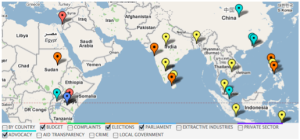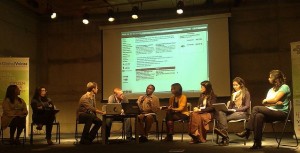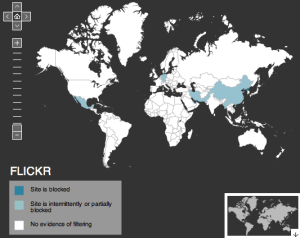Hat tip: Jill
GV Uganda: Bloggers react to bomb blasts
Yesterday, three bombs went off in Kampala, one at an Ethiopian restaurant and two at the Kyadondo Rugby Club. Both places were packed with people watching the final game of the World Cup.
More than three years ago, I wrote about why I opposed sending Ugandan troops to Somalia. At the time, I noted that “insurgents have ‘vowed to kill the incoming peacekeepers’ and have been launching almost daily attacks in Mogadishu, and Eritrea has warned that the presence of Ugandan forces could prompt a full-out war.”
Yesterday, three bombs went off in Kampala, one at an Ethiopian restaurant and two at the Kyadondo Rugby Club. Both places were packed with people watching the final game of the World Cup. Uganda police are blaming Somali militant group al-Shabab for the attacks. A leader of the group, which has ties to al-Qaeda, recently announced, “We urge our brothers from Chechnya, Pakistan, Afghanistan and from anywhere around the world to attack the diplomatic missions of Uganda and Burundi.”
Al-Shabab has not yet claimed responsibility for the attacks, but the police and the media seem to be taking their role as a given. If the bombs are indeed traceable to them, this would be the first time al-Shabab has operated outside of Somalia.
I heard about the bombings in Kampala on Twitter last night and have been reloading Google Reader since looking for more news. As far as I can tell, the blogren and my other friends in Kampala are all safe, though obviously shaken up. Baz pointed out that the location of the attacks has meant that Twitter and Facebook have played a huge role in spreading news:
Because of the location of the attacks, for once, it’s us, The Web 2.0 generation, that is affected, so we are watching our twitter and facebook feeds with trepidation, like any second now…
Thanks to those of you who’ve blogged and tweeted and commented, letting me know you’re safe. I’ve hastily pulled together the blog posts I could find for a post on Global Voices:
Soccer fans gathered in bars and restaurants around the globe to watch the final game of the World Cup last night. In Uganda, these celebrations were interrupted when bombs exploded at two popular nightlife spots in Kampala, the country’s capital.
I’ll keep checking throughout the day in case there’s any more news. The Daily Nation is reporting that Uganda’s increasing, rather than decreasing, the number of troops it has in Somalia. Blogren, if you have anything to add, you know where to find me. My thoughts are with you and your families, and I’m praying that these are isolated incidents, rather than the precursor to the full-out war Eritrea predicted three years ago.
Also, in the course of writing the GV post I came across these photos by Trevor Snapp, a documentary photographer in Kampala. He understandably would prefer to be paid for his amazing work and has asked that I not replicate the photos on GV, but I highly recommend that you check them out.
UPDATE: Trevor has since decided to allow Global Voices to use one of his photos, free of charge, in the post. A million thanks to him for supporting nonprofit citizen media!
Tech for Transparency, v2
Today we officially launched the second phase of the Technology for Transparency Network, a Rising Voices project that documents and maps projects around the world that use online technology to promote transparency and accountability.

During the first phase, which ran from January to May of this year, we mapped 37 case studies from Central & Eastern Europe, China, Latin America, South Asia, Southeast Asia and anglophone Sub-Saharan Africa. Between now and September, we’ll be nearly doubling that number and expanding our focus to include projects from the Middle East & North Africa, the former Soviet Union and francophone Africa.

Researchers from the Technology for Transparency Network present at the 2010 Global Voices Summit in Santiago, Chile. Photo courtesy of FabsY_ on Flickr.
I am psyched to be co-heading the project along with the formidable and talented Renata Avila. We’re thrilled to be working with an amazing team of researchers and advisors, including our new editorial advisor Hzel Feigenblatt. Hazel is the Media Projects Director at Global Integrity and will be working with us to make sure we interview the most innovative and exciting projects in this space.
If you have an idea for a case study, let us know! We’re currently taking suggestions in English, Spanish and Portuguese. You can also subscribe to our RSS feed to get updates when we publish new case studies, follow us on Twitter (@techtransparent) and become a fan on Facebook.
Little Brother and America as a police state
On Jer’s recommendation, I’m reading Cory Doctorow’s Little Brother, which you can and should download for free from his site.
The book is a fictional account of a high school kid — a smart, technologically skilled high school kid — who ends up on the wrong side of the Department of Homeland Security after a terrorist attack in San Francisco. As I sat in Dulles airport last night waiting for my flight back to Boston, I realized just how much information I put online and how little effort it would take the DHS to throw me in a holding cell were the American government so inclined.
I came to work this morning to news that the Senate Committee on Homeland Security and Governmental Affairs has approved the Protecting Cyberspace as a National Asset Act, which among other things gives the president the power to force ISPs and search engines to limit or shut down connections at his whim. Oh, and by the way, the ACLU has announced that “Americans have been put under surveillance or harassed by the police just for deciding to organize, march, protest, espouse unusual viewpoints and engage in normal, innocuous behaviors such as writing notes or taking photographs in public” in at least 33 states.
I’m trying not be alarmist about this, but maybe I should be?
Social media filtering around the world
Last summer I built a set of maps for the OpenNet Initiative showing where five of the most popular social media sites — Facebook, Flickr, Orkut, Twitter and YouTube — are censored around the world.
A lot has happened in the last year, both social media censorship-wise and in the world of online mapping. I’ve taken this opportunity to update the map data and to give the maps themselves a bit of a makeover. Voila:

These are accurate to the best of my and ONI’s knowledge — the data comes from testing we conducted in 2008-2009 as well as from censorship reporting site Herdict and media reports. If you have trouble accessing one of these sites, please let us know so we can update accordingly.
For more information on the methodology and reasoning behind these maps, and for all the fun features (clicking! zooming! changing from Facebook to Twitter and back again!), check out the social media filtering map on the ONI site.
